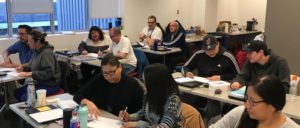PLATO Testing, Canada’s only Indigenous-staffed and Indigenous-led software testing company, recently launched its Indigenous Software Tester Training Course in Victoria for the first time.
The company, based in New Brunswick, offers the program to Indigenous people in other cities across Canada and is now offering it at the Camosun Coastal Centre (there is no connection between the course and Camosun College). After the course is fully completed PLATO guarantees a full-time job to all successful graduates.
“We created a training course to introduce people to the concepts and basics of software testing,” says PLATO Testing founder Keith McIntosh. “So we created it short enough, it’s a five-month course, you can see the end, and at the end of that course you’d be skilled.”

McIntosh says PLATO is really excited about the Victoria launch, adding that software testing can include testing websites, content addition, SAP implementation, and testing mortgage and insurance software performance.
“Some software requires a university degree to do it, but some aspects of testing only require problem solving or logical and critical thinking,” he says. “This is a piece in the IT industry that has multiple entry points, and has the ability to morph, to grow into a career by experience rather than having to have a certificate at a university with a four-to-five-year program.”
McIntosh says that PLATO Testing aims to offer Indigenous students a path into technology, and to do that, courses like this one are free.
“It costs us a fair bit to run the course, but we do that through acquiring partners and government sponsorship, government funding, just trying to keep the costs for students as low as possible,” he says.
PLATO promises that their leaders are dedicated to reconciliation.
“You know, we do our best,” says McIntosh. “And we have people that work with us, for, I believe… the right reason… People want to feel [they are] part of something, that they are making the world a little bit better. I think we do our best and are doing it because we want to leave the world a little better then we found it.”
The training course in Victoria is being offered in collaboration with the provincial government, the Métis Nation British Columbia, and professional-services firm Deloitte Canada.
“Technology is the one thing that we can take from downtown Vancouver to Port Hardy, up on top of the island or anywhere in Canada,” says McIntosh. “Technology doesn’t have to be rooted in cities. It can be taken to remote First Nations and Indigenous communities across the country.”
